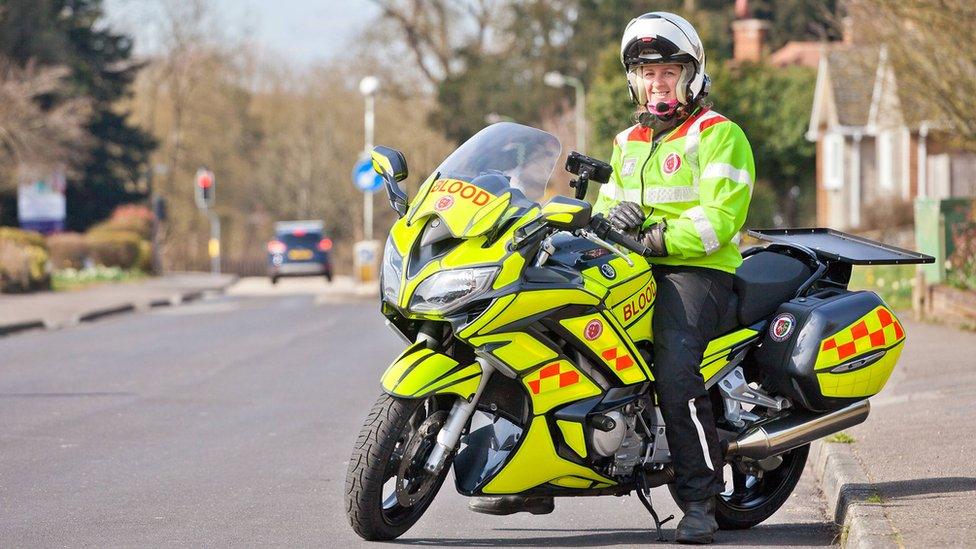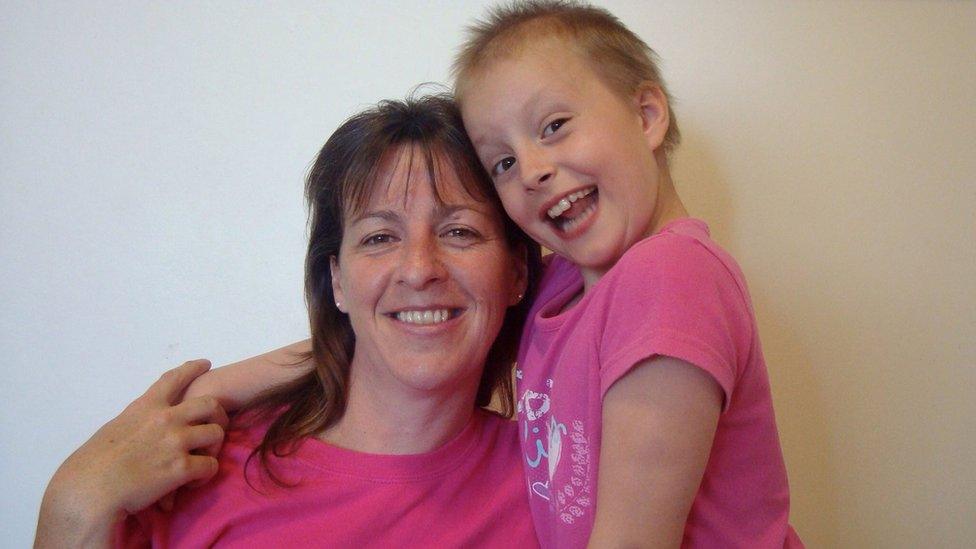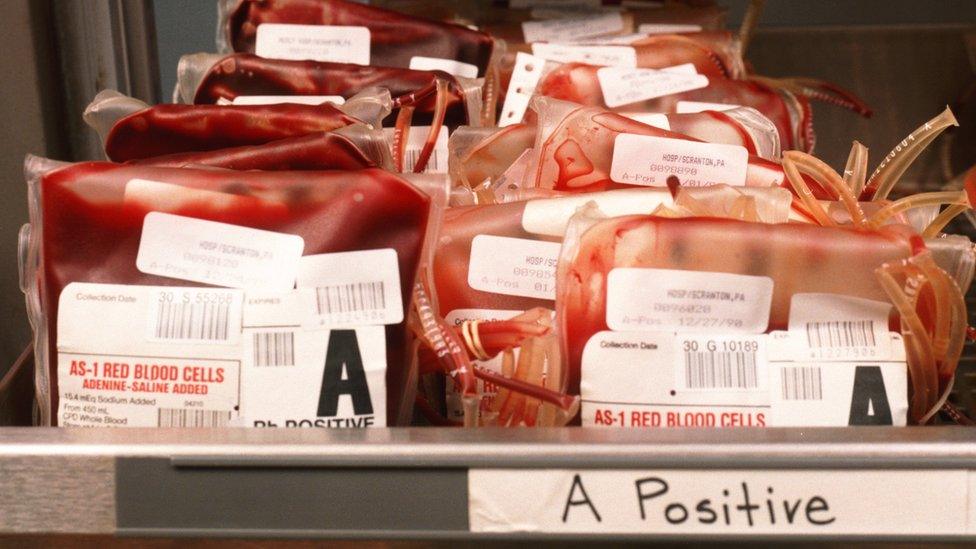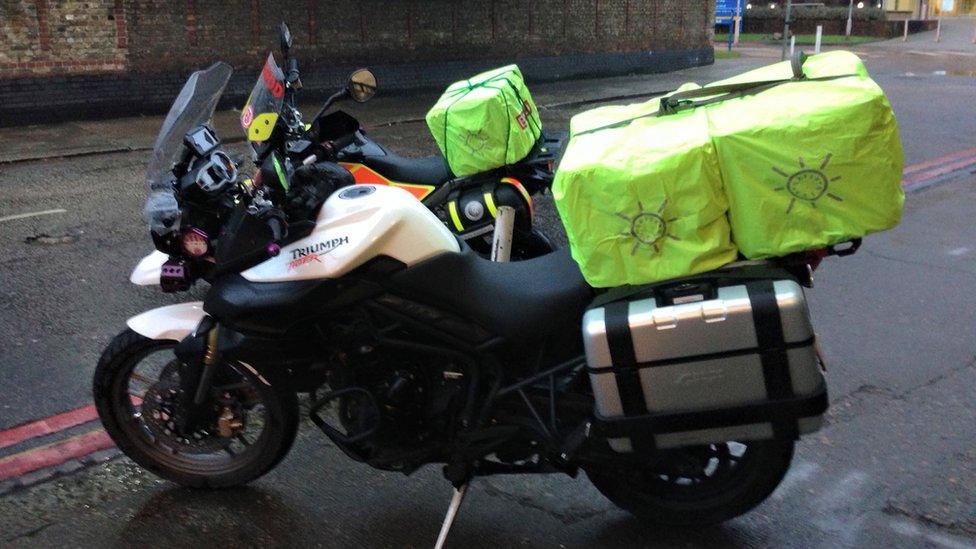Blood bikers: The volunteer motorcyclists who help the NHS
- Published

Across the UK, a group of volunteer motorcyclists is helping the NHS by delivering blood. What motivates them, asks Simon Fry.
Isabel Kydd is on call for 80 hours of one week each month.
At very little notice, she can be woken in the night and find herself riding a motorbike with a vital delivery for a hospital.
But she's not an NHS employee. She's just a volunteer, one of 1,400 advanced qualified riders of the Nationwide Association of Blood Bikers (NABB).
In 2013, the association's bikers responded to around 35,000 rapid transport requests from 262 UK hospitals. They are almost a Deliveroo for the NHS.
It's not just blood, with the bikers also delivering surgical tools, human milk, spinal fluid, faecal matter (for faecal transplants) and even rabies serum conveyed via panniers on their powerful motorbikes.
According to NHS Blood and Transplant, volunteers delivered 1.32% of all the units of blood moved in 2015. That seems small but equates to 29,300 blood units.
Kydd first discovered blood biking when on a course at the Institute of Advanced Motorists. Her "observer", himself a blood biker, warned their training ride might be stopped if he was called away.

Kydd's niece, Caitlin, who was having cancer treatment, "had big, burly bikers wiping their eyes"
Kydd started volunteering as a rider for a Kent group called SERV (Service by Emergency Response Volunteers). She later discovered that blood bikers had helped her own niece. Caitlin, undergoing cancer treatment, had received platelets delivered by an SERV Kent rider on Christmas Eve 2009.
It's an emotional process for many of the riders when they reflect on the work they do.
"Caitlin had these big, burly bikers wiping their eyes as she said how they had played their part in saving her life twice," says Kydd.
"I was just drawn to it immediately as a way of helping the community and being on the bike at the same time," says Kydd. "I thought this would be a great way of giving something back for the great care Caitlin had received."
Blood biking is almost a subculture within a subculture. You can see a presence at many motorcycling events at Silverstone and Brands Hatch, where bikers are encouraged to sign up for their advanced training and join the blood bikers.
The movement grew out of two groups in the 1960s. In the early part of the decade Margaret Ryerson and her husband formed Surrey's Emergency Volunteer Service to put riders' love of motorcycling to practical use supporting hospitals.
In 1969, Des Gibbons created the Freewheelers youth community action group providing a similar hospital transport service serving Stevenage's Lister Hospital, the Luton & Dunstable Hospital, Hitchin Hospital and maternity unit and two Bedford hospitals.

NHS hospitals may need blood deliveries at any time of day or night
Now blood bikers are braced to be called out in the night in all weather.
"One of my first urgent runs was for a platelets delivery for Maidstone Hospital, which I had to collect from Tooting in the middle of the night," says Kydd. "It's a challenge waking up sometimes and trying to take in the information but as soon as you hear the word 'urgent' adrenalin kicks in and suddenly you're very alert.
"The patient was very ill and they needed them as soon as I could possibly get them there. I've also done runs in torrential rain. They are quite a challenge as visibility is reduced and it's altogether just wet and horrible."
The vast majority of riders are men - just 4% are women.
The bulk of the blood bikers' dedicated fleet bikes are mainly BMW RTs, Triumph Trophies, Honda ST1300s and Yamaha FJR1300s. Riders cannot exceed the speed limit currently, but there are hopes the law will be changed.
"My sister and Mum worry a bit but they know I've had really good training and am as safe as I can be," says Kydd.
For blood bikers like Kydd, volunteering comes at a price. "All costs are met by the volunteers. When using our own vehicles we pay all running costs including fuel. When I'm using the response bike [the liveried bike provided by the charity] I still pay for all the fuel myself while the charity pays for the bike's upkeep. A busy week can prove very expensive."

The blood bikers may also be called upon to deliver surgical tools or vital serums
But why does the NHS need volunteer blood bikers at all?
The NHS benefitting from unpaid manpower is not unusual, according to Sir Leonard Fenwick, chief executive of Newcastle upon Tyne Hospitals NHS Foundation Trust. "The NHS nationally has thousands of volunteers in hospitals and communities and if the blood bikers' service was lost the NHS would be obliged to make alternative arrangements - the cost would be many thousands in both pounds spent and people served across the North East."
According to the most recent figures available from the NABB, one group alone saved the NHS over £120,000 in 2010 in making 2,500 deliveries and travelling over 100,000 miles at a cost of around £25,000, all of which was paid for by charitable donations.
As well as her riding, Kydd tries to encourage others to join. She inspired a fellow female member of her advanced biking group to become a blood biker in Essex, and is proving a role model at home.
"My two boys [now 26 and 24] took up biking themselves when I did after I bought my 125 [cc motorcycle]. I think it was a case of 'if mum can ride a bike so can we'."
Join the conversation - find us on Facebook, external, Instagram, external, Snapchat, external and Twitter , external